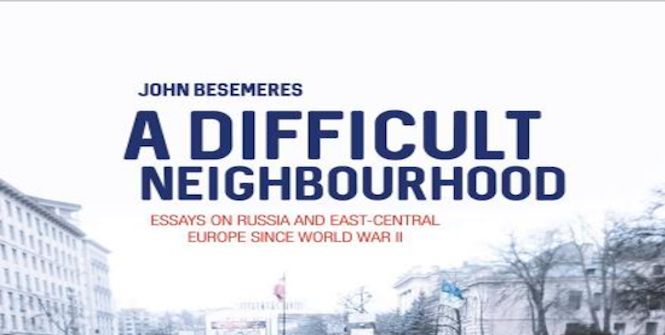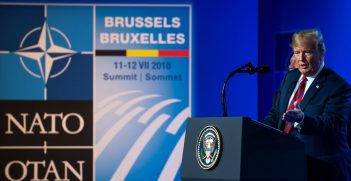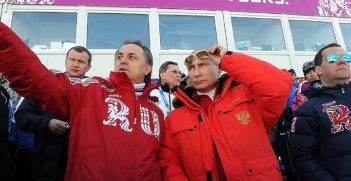Reading Room: A Difficult Neighbourhood

Russia’s aggression against Georgia and Ukraine as well as its reluctance to resolve the frozen conflicts in the region demonstrate that Eastern Europe is again a contested geopolitical sphere between Russia and the European Union. President Putin has now gone further, unleashing a range of active measures against Western democracies in an effort to destabilise the EU and achieve the lifting of sanctions imposed after his annexation of Crimea. By and large, these efforts have backfired as we witness the revelations of electoral interference in the United States and France.
To shore up his domestic support, Putin has also constructed a parallel historical narrative that the West deliberately sought to weaken Russia after the collapse of communism, notably by the expansion of NATO. This view of recent history is widely shared in Russia which is not surprising given the government’s almost absolute control over the media.
As the author points out in a series of excellent essays, partly historical and partly contemporary, the main battleground in this quasi new Cold War are the countries of Eastern Europe, especially Ukraine. The country–the very existence of which as an independent state President Bush questioned in 1991–is, however, its own worst enemy. The role of oligarchs and levels of corruption mirror that in Russia.
Although most Russians did not wish to see the demise of the Soviet empire they were prepared to live with the consequences. However, the Putin elite was on the alert for any opportunity to reverse the events of 1991. The Orange Revolution was a red rag to Putin, fearful that a democratic Ukraine could act as a magnet for reformers in Russia. Ukraine’s decision to sign an association agreement with the EU in 2013 was the last straw for the Kremlin. Putin ordered the annexation of Crimea and encouraged separatist forces in Eastern Ukraine. The West responded with economic sanctions that, to the surprise of many, have held firm and were renewed in June 2017.
Many books comprising essays are often disjointed but the author has made a serious effort to link up the chapters by offering a valuable historical perspective of Russia’s relations with each country in the region as well as contemporary analysis. There are, for example, fascinating essays on the wartime experience of Poland, the communist-era under Gomulka and the subsequent revolution led by Solidarnoc. One of the best sections covers the ups and downs of the Polish-Russian relationship during the Tusk and Kaczynski eras.
The different approaches of Russia to Belarus and Moldova plus Armenia, Azerbaijan and Georgia are carefully assessed. Blame is not all on the Russian side. The author rightly criticises Georgian President Saakashvili for playing into Putin’s hands by ordering a military resolution of the occupied territories of South Ossetia and Abkhazia.
There are some telling criticisms of Western policy including the NATO decision in Bucharest in 2008 that Georgia and Ukraine “would one day become members of the alliance” when no one was prepared to accept either country in NATO. The author, however, does not cover the long-standing and widely-held belief in Russian military circles that the creation of buffer states on Russia’s western borders is an imperative given what has happened in Russian history.
The author provides an interesting insight into the nature of the Putin regime and how the master in the Kremlin maintains power by ensuring his protegés share the spoils while protected by the state security forces or siloviki. The media and civil society are both neutered. Any opposition is crushed, often by brutal killings: as in the fate of Anna Politkovskya, Boris Nemtsov and Sergei Magnitsky.
The author suggests that we may be in for the long haul in dealing with Putin, who could be in the Kremlin until 2024. Indeed where would he go if he decided to resign? Gorbachev earned a tidy sum from lecture tours in the West but Putin might be arrested for crimes against humanity if he tried to visit countries such as Spain.
So what should the West do? Apart from strategic patience, the author calls for a tougher approach, arguing that the West should not shirk from supplying weapons to Ukraine.
The book was completed before the advent of President Trump. His refusal to criticise Putin in any shape or form adds a further dimension to what is clearly a failed ‘reset’ in US-Russia relations. The American angle is important as the US remains an important balancer in the West’s relations with Russia. How this relationship develops might well be the subject of a further collection of essays from the author.
John Besemeres, A Difficult Neighbourhood, ANU Press, 2016
Fraser Cameron is Director of the EU-Russia Centre in Brussels. He visited Australia last month to speak at the EU-Australia Leadership Forum.





